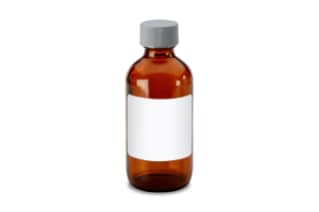
|
Separation Mode |
Reversed Phase |
|
Detection Method |
UV |
|
Formulation |
Liquid |
|
Storage Condition |
Room Temperature |
|
System Type |
LC |
|
Quantitative |
Yes |
|
Shelf Life |
12 Months |
|
Shelf life upon reconstitution |
1 Week |
|
Shipping Condition |
Ambient |
|
Volume |
100 mL |
|
Type |
Calibration |
|
UNSPSC |
41116104 |
|
Application |
Food |
|
Product Type |
Standards |
|
Units per Package |
1 pk |
Beverage Analysis 5 Standards Solution
Waters recognizes that soft drink manufacturers must safeguard their quality standards while producing consistent goods. The soft drink market is a significant profit center for many beverage manufacturers because their products frequently contain caffeine as an energy booster, sodium benzoate and potassium sorbate as preservatives, and diet formulations of the artificial sweeteners acesulfame K, aspartame, and saccharin. A specific beverage may contain any combination of these ingredients at varying levels, which is why, for quality control purposes, analyte target range conformance to prescribed values is crucial.
Beverage makers rely on stringent quality control requirements to ensure that their products continually fulfill customer expectations for taste and label claims while also adhering to regulatory regulations.
Quality control laboratories that support these industrial settings require simple, quick analytical procedures for testing product batches to ensure that only those batches that fulfill standards are processed and released. Waters provides solutions that connect effortlessly to existing production quality control systems. This ensures that only the highest quality and consistent beverages are supplied to the market, resulting in the best possible customer experience and the reinforcement of high-value brands.
Waters meets the particular demands of beverage manufacturers by providing simple, easy-to-use solutions designed to increase laboratory productivity, improve data quality, reduce costs, and improve product consistency.
In conjunction with the Beverage Analysis Standard Solid, the Waters Beverage Analysis 5 Standards Solution is intended for the analysis of soft drink compositions for sweeteners and preservatives (186006010). This solution comprises 150 mg/L acesulfame-K, 100 mg/L saccharin, 100 mg/L caffeine, 200 mg/L benzoate, and 100 mg/L sorbate. This 5-component solution comes in a 125 mL amber bottle and is sold as a refill for the Beverage Analysis Kit (176002534).
You can look through our brochure or our website to see the whole Waters product line and shop for lab equipment to add more outstanding lab equipment to your laboratory or refill your stock as needed.
You should also look at the LCMS Certified Clear Glass 12 x 32 mm Screw Neck Vial, with Cap and Preslit PTFE/Silicone Septum, 2 mL Volume, 100/pk; All Waters. The manufacturing methods and handling procedures for LCMS Certified vials are strictly supervised. They are mass spectrometer tested and come with a certificate of analysis displaying the reference and vial scan for the production batch.
Why Is It That Mass Spectrometry Only Detects Cations?
Because mass spectrometry detects the mass of charged particles, only ions are detected; neutral molecules are not.